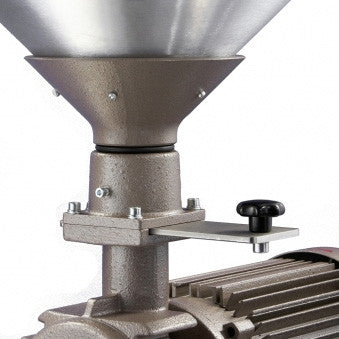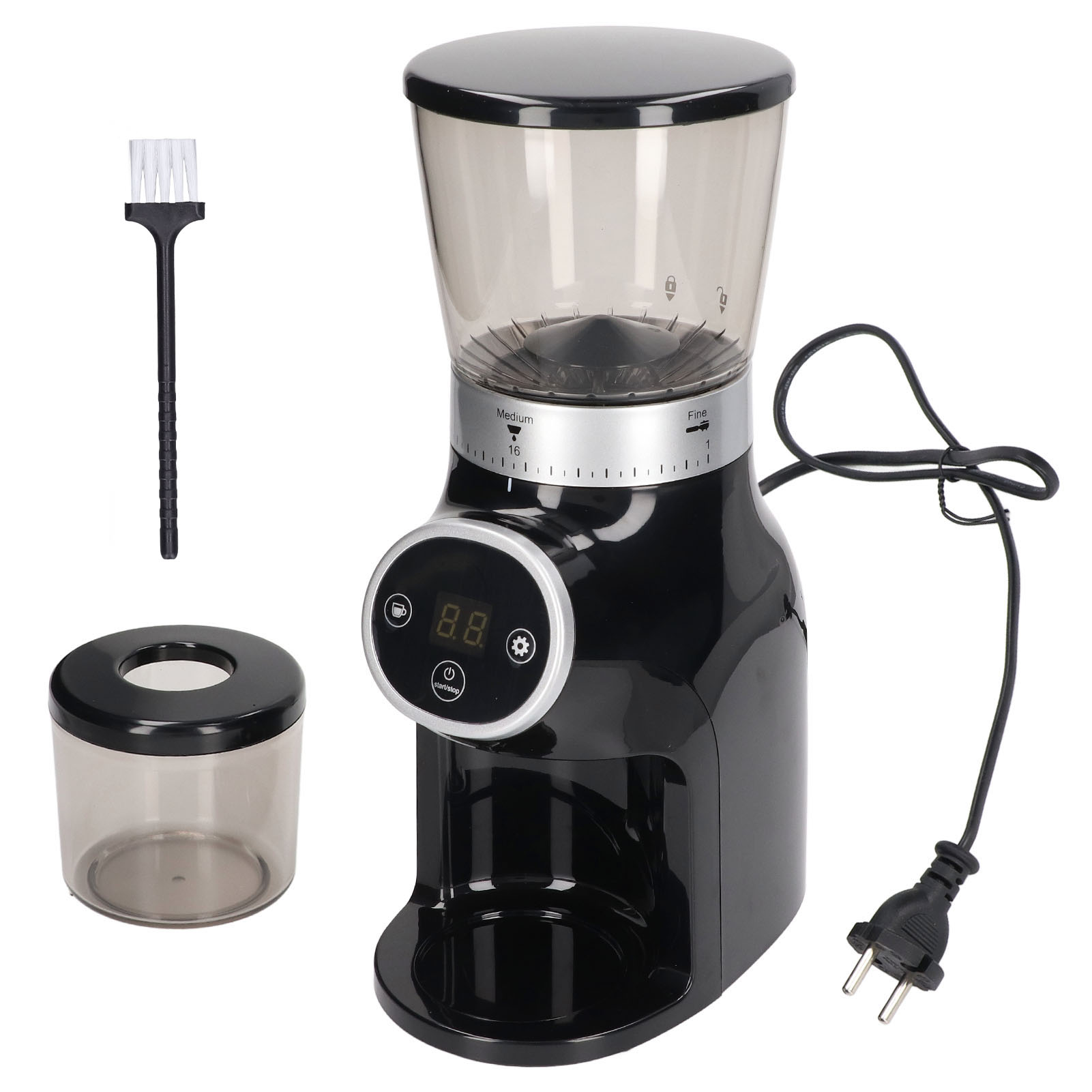Exactly How to Choose the Perfect Industrial Coffee Grinder for Your Service
Selecting the ideal industrial coffee grinder for your company is a multifaceted choice that calls for careful consideration of a number of critical aspects. In addition, recognizing the various types of grinders offered can considerably affect your operational effectiveness.
Assess Your Grinding Requirements
When picking a commercial coffee grinder, one have to initially evaluate their grinding needs to make sure optimal performance and uniformity. This first examination involves understanding the quantity of coffee to be refined daily, along with the wanted grind size for numerous brewing techniques. A high-capacity grinder might be essential for businesses offering big quantities of coffee, while smaller sized procedures may discover an extra small model sufficient.
Moreover, it is necessary to think about the sorts of coffee beans being utilized, as different beans may need specific grinding strategies to accomplish the very best flavor account. Oily beans may necessitate a mill developed to take care of such attributes without overheating or clumping.
Specialty coffee services commonly demand precise work sizes to improve extraction and flavor, making it important to choose a grinder that can supply consistent outcomes. Evaluating the offered room and electric requirements will aid in selecting a grinder that fits perfectly into your operational workflow.
Understand Grinder Kind
Recognizing the numerous sorts of commercial coffee mills is important for making an informed selection that meets details operational demands. There are mainly 2 groups of mills: blade mills and burr grinders.
Blade grinders use spinning blades to cut the coffee beans, resulting in an inconsistent work dimension - Industrial Coffee Grinder. While they might be a lot more cost effective, they are frequently not suitable for commercial applications where accuracy is crucial
On the various other hand, burr grinders give a more consistent work by crushing the beans in between two surface areas. They can be further categorized right into flat burr and cone-shaped burr grinders. Apartment burr grinders supply a consistent work dimension and are typically favored for coffee prep work, while conelike burr mills are flexible and can deal with a variety of brew approaches, from espresso to French press.
When selecting a grinder, take into consideration the particular requirements of your organization, consisting of preferred grind uniformity, manufacturing volume, and the sorts of coffee drinks you prepare to supply - Industrial Coffee Grinder. Each mill type has its restrictions and advantages, so recognizing these nuances makes it possible for educated decision-making that lines up with functional objectives
Evaluate Work Size Consistency
Achieving work size consistency is necessary for producing premium coffee, as variants in fragment dimension can dramatically impact extraction and flavor. When picking a commercial coffee mill, it is essential to review how well the maker preserves harmony in work size across various batches. Inconsistent work sizes can result in irregular removal, causing a mug that may taste extremely bitter or weak.
To assess work size uniformity, consider grinders with features such as flexible work setups and high-grade burrs. Burr mills, in particular, excel in creating consistent particle sizes contrasted to blade mills. The material and form of the burrs play a crucial function, with stainless-steel and ceramic options offering resilience and accuracy.

Take Into Consideration Production Capacity
In the fast-paced world of coffee production, taking into consideration manufacturing capacity is vital for companies intending to satisfy need without compromising top quality. The production capability of a commercial coffee grinder directly affects a company's ability to accomplish orders effectively, handle inventory, and reply to fluctuating market trends.
When assessing manufacturing capability, it is vital to assess the grinder's outcome price, commonly gauged in extra pounds per hour. This measurement must align with your service's forecasted sales quantity and growth targets. As an example, a café with a high turn over might need a grinder that can try here refine numerous hundred pounds daily, while a smaller sized procedure might be adequate with a reduced capacity version.
Additionally, think about the kind of coffee being refined. Different beans and blends might impact grinding speed and performance, necessitating a grinder with the ability of managing diverse production requirements. It's additionally worth considering the grinder's capacity to maintain regular high quality under high result problems, as any kind of fluctuations can influence the last item.
Inevitably, picking a grinder that matches your company's manufacturing capacity will guarantee you continue to be receptive and affordable to customer assumptions.

Spending Plan and Maintenance Aspects
When examining the best commercial coffee grinder, upkeep and budget elements play a substantial duty in the general decision-making procedure,. A first investment in a high-quality grinder can generate long-term advantages, however it's important to establish a clear spending plan that straightens with your organization's functional demands. Take into consideration both the purchase price and prospective functional costs, such as power intake and substitute components.
Maintenance is another vital aspect that can impact your budget. Industrial coffee grinders require regular upkeep to ensure optimal efficiency and longevity. Evaluate the supplier's recommendations for maintenance, consisting of cleaning schedules and components replacement, as these will influence long-term functional prices. Furthermore, consider the schedule of service and assistance, as dependable support can reduce downtime and repair service expenditures.

Purchasing a mill that is long lasting yet very easy to maintain can save cash over time. While lower-priced choices might be alluring, they may sustain higher upkeep costs and minimized efficiency. Inevitably, balancing preliminary expenses with long-lasting maintenance and functional effectiveness will direct you to the most effective choice for your organization's coffee grinding needs.
Final Thought
Selecting the optimal commercial coffee grinder necessitates a comprehensive examination of grinding requirements, mill types, grind size uniformity, manufacturing ability, and monetary considerations. By focusing on these variables, companies can guarantee the acquisition of a trusted, effective mill that fulfills certain functional demands. An appropriate mill not only improves the top quality of the coffee produced but additionally adds to the total success and productivity of the enterprise. Long-lasting performance and maintenance simplicity must stay central to the decision-making procedure.
Specialized coffee organizations often require specific work dimensions to improve removal and taste, making it crucial to select a grinder that can supply uniform outcomes. Flat burr grinders supply a constant work dimension and are find here usually preferred for coffee prep work, while cone-shaped burr mills are functional and can manage a variety of mixture methods, from coffee to French press.
When picking an industrial coffee mill, it is crucial to evaluate exactly how well the device preserves uniformity in grind dimension throughout different sets. Burr mills, in certain, succeed in producing consistent fragment dimensions compared to blade grinders.Selecting the optimal commercial coffee grinder necessitates a complete assessment of grinding needs, mill kinds, grind size uniformity, production Get More Information ability, and monetary factors to consider.